7B Unit2 Grammar
Unit 2 Grammar课件初中英语七年级下册(牛津译林版)

help mother do some housework cook dinner for buy her a present/ flower... write a letter/ postcard to her study hard ...
Post-task
一、用正确的时态填空
will
1. Women’ Day is coming.aIm__g_o_i_n_g__t_o_g_i_v_e___ (give) my mother a present.
2. -- What _a_r_e_ you ___g_o_i_n_g__t_o_b__e_ (be) when you
We shall/ will have classes tomorrow.
Will you have classes tomorrow?
Yes, I(we) will / shall.
后天
Will you have classes the day after tomorrow?
No, I (we) wiwllonno’t / shashllanno’t. t t
3W.We e aren’t gnooitndgotooudro outrohnoigmhte=wthoirsk
tonight/this evheonminegw. ork evening
4T.hTehtwe itnwin brontohteprlsayaren’tngeoxitnTguetosdpalyay
Sum up(总结) the time expressions in the simple future tense.
将来时的典型标志:
7BUnit2NeighboursGrammar(共48张PPT)

6._____ Shall we go walking in the hills? are going to show you different 7.Today we ____________ styles of clothes. 8.He ____ will fly to New York next month. am going to visit our new neighbours. 9.I _______________ 10.I’m afraid theywon’t _____ welcome visitors like you.
4. “There be”句型的一般将来时: (1)There will be … (2)There is/are going to be …
e.g. There is going to be a football match this Saturday afternoon. There will be a new bridge over the river next year.
Talking about the future with “be going to” 主语 I He/She/It Be动词 am is going to +动词原形
We/you/they
are
Talking about the future with “be going to” I We /You / They He /She / It am not are not going to is not +动词原 形
Simon: Hi, Amy. My parents and I are
planning a day out with my uncle’s
7B_Unit_2_Grammar课件

Which can we count …?
rice
12 bananas
bread
4 tomatoes
meat
1 egg
milk
3 lemons orange
可数名词) Countable Nouns:(可数名词)
不可数名词) Uncountable Nouns:(不可数名词)
不可数名词量的表达
Homework
《学习与探究》第二单元第5课时
How much
How many
How much
How many
Howmuch
*对不可数名词的量进行提问时,分两种 情况:
1)对不可数名词前表示数量的词整体提问时, 要用‘How much’. There is a glass of juice in the fridge. How much juice is there in the fridge 2)对不可数名词前的数词提问,要用‘How many’ There is a glass of juice on the table. How many glasses of juice are there on the table
How many 7. ___________ bottles of juice can you give me? Nothing. How often 8. ___________ do you exercise in your school? Every Tuesday and Thursday. How much 9. ___________ does he spend on the MP3? How soon 10. ___________ shall we know the answers? How much 11. ___________ TV do you watch every night? About one hour. How long 12. ___________ do you watch TV every night? About one hour. How many 13. ___________ sheep are there in the hill?
七年级上册英语Unit2 Grammar知识点总结及练习-译林版(含答案)

Unit 2 Let’s play sports!Grammar随堂小练习I.用所给动词的适当形式填空。
1. Simon’s cousin _______(look) tall and slim.2. Millie________ (have)an MP3 player.3. My cousin, Tony________(not do) his homework in the evening.4. What about ________(go) swimming this afternoon.5. Let Sandy _________(help) you with your English.【KEYS】I.1. looks2. has3. doesn’t do4. going5. help第一部分讲解分析一、新词的导学与解读1.weekend【用法】n.周末,【举例】What are your plans for the weekend?你周末计划做什么?【拓展】weekend的意思是“周末”,指星期六、星期日两整天,weekday可数名词,意为“工作日”,“在工作/上学日”翻译成“on weekdays”【实践】翻译句子。
我正在考虑在何处度周末。
_____________________________________.【点译】I was wondering where to spend the weekend.2. at weekends/ at the weekends/ on weekends on the weekends【用法】在周末;at weekends“每逢周末,在周末”,at/on weekends = at/on the weekend ,西方的人们把星期天看成是一个星期的第一天,所以weekend指的是Friday和Saturday。
但在国内,weekend指的多半还是Saturday和Sunday。
译林版英语7B unit2 neighborhoods Grammar

永城市第三初级中学
郭淑萍
ห้องสมุดไป่ตู้
3/10/2013
教学目标
基数词与序数词
什么是数词?
表示数目多少或顺序多少的词叫数词, 数词分为基数词和序数词。表示数目 多少的数词叫基数词;表示顺序的数 词叫序数词。
基数词
eight
four one two three
five
seven
six
zero
nine
one
six---sixth eight---eighth •ten----tenth
twenty---twentieth
forty---fortieth sixty---sixtieth
thirty---thirtieth fifty---fiftieth seventy---seventieth ninety---ninetieth
ordinal numbers(序数词 )
一、二、三,特殊记, 加th从4起, 八少“t”,九去“e”, “ve”要用“f”替,(five, twelve) 见“y”变成“i”和“e”,词尾加上 “th”, (twenty,thirty,---ninety) 若是遇到几十几,只变个位就可 以。
Can you write their ordinal numbers? 2 9 5 14
100
12 19 8 40 101
72 90 18 44 1000
twelfth •December is the ________ month of the year. second •Monday is the _______ day of the week. first •English is spoken by most people as their _______ language in the USA, Great Britain, Australian, and Canada. •The Games of the twenty-ninth Olympic in 2008 _____________ will be held in the city of Beijing. •I’m hungry. I’ve eaten three apples. Would you fourth please give me a_______ one? twenty-first •At the beginning of the _____________ century the world’s population has passed 6 billion. •He got off this bus and got on a second one. ______
2020-2021年度七年级英语下册双休日作业unit2)(第2周)有答案

7B 双休日作业 (内容:Unit2 Welcome--Grammar)班级:_______ 姓名;__________ 家长签字:_________一、单项选择。
(共20小题;每小题1分,满分20分)1. Mr Wu is a ____________ person. You can ask him for help.A. helpfulB. healthyC. lazyD. strong2. Tony, ________ his father, __________ walking from home to school.A. likes; likeB. likes; likesC. like; likeD. like; likes3. Mr Zhang doesn't have a good_______ . He has too much ______ to do every day.A. job; workB. work; jobC. job; jobD. work; work4. --Excuse me, what time does Flight BA 2793 leave? --Just a minute. I ___________ it for you.A. checkB. checkedC. will checkD. have checked5. Please ________the box away and _______ me a cup of tea. I'm not________ to________the box.A. take; bring; strong enough; takeB. take; take; enough strong; carryC. take; bring; strong enough; carryD. bring; take; enough strong; bring6. -- Why not come here on Saturday? I think you'll like it. --_______ !A. That's all rightB. Never mind(没关系)C. That's a good ideaD. No problem7. --It's too cold. How about ____________?--Good idea.A. make fireB. make a fireC. making fireD. making a fire8. There a folk music concert in Xinjiang Opera Theater next month.A. is going to haveB. will haveC. isD. is going to be9. Michael _______ in a school in Yunnan from February to June next year.A. teachB. taughtC. will teachD. was teaching10. --I don't know when my uncle will come here. -- I think he _____ if it __________tomorrow.A. will come; won’t rainB. will come; doesn’t rainC. comes;won’t rainD. comes; doesn’t rain11. --Can you find___________ to fix the machine? -- _______________ , of course.A. one; YesB. someone; NoC. anyone; YesD. anyone; No12. Look! The clock has stopped. Maybe there's wrong with it.A. everythingB. somethingC. anythingD. nothing13. --- _________? --Yes. My watch doesn't work.A. What will you doB. Are you not feeling wellC. Do you need any helpD. What help do you need14. Mrs Smith lives next to our house. She is really a good _______ because she is always ready tohelp people around her.A. visitorB. waiterC. neighbourD. engineer15. a student, you shouldn't talk to your teachers that.A. Like; asB. Like; is likeC. As; is likeD. As; like16. --Would you like to the Palace Museum with me? --____________.A. to go; That's rightB. going; No, I'd likeC. to go; Yes, I'd like toD. going; Yes, I'd like to17. --What _____ Amy going to buy? --She will buy some plates and forks. What______ we buy then?A. is; shallB. are; shallC. will;willD. is;are18. --Let's go out to play football, shall we? --OK. I_________.A. will comingB. be going to comeC. comeD. am coming19. -- _________ your cousin _________ visit the Great Wall tomorrow? --Yes, she is.A. Will;/B. Shall;/C. Are; going toD. Is; going to20. --Tom, please come here. I have to tell you. --OK.A. anything importantB. important anythingC. something importantD. important something二、完形填空。
7B Unit 2 GrammarA课件

*对不可数名词的量进行提问时, 分两种情况:
1)对不可数名词前表示数量的词整体提问时,要用‘How much’. There is a glass of juice in the fridge. How much juice is there in the fridge? 2)对不可数名词前的数词提问,要用‘How many’ There is a loaf of bread in the box. How many loaves of bread are there in the box?
7B Unit 2
Grammar(1)
鲁河中学 陈寿红
Can you count …?
Countable:
Uncountable:
不可数名词量的表达
a loaf of bread
two loaves of bread
three cartons of milk one carton of milk
ห้องสมุดไป่ตู้
the rich the young
某些专用名词和习惯用语中用定冠词。 某些专用名词和习惯用语中用定冠词。
the Great wall
by the way
Exercises(在需要的地方填上正 确的冠词)
Where is Peter ? He isn’t at _____ () school. Do you enjoy playing ____ () football? There is only ___ () apple and ___ () milk in the fridge. ____ (the) umbrella belind the door belongs to Sandy. At Mid-Autumn Festival ,families get together to enjoy ___ () bright round moon. I have ____ () new bike .Every day I clean ____() bike very carefully.
译林牛津版七年级英语下册7B Unit2 知识点详解

Comic stripe1.Welcome to Sunshine Town.欢迎到阳光镇!☆welcome to sp欢迎来到某地☆welcome是及物动词,意为“欢迎";它还可以作形容词,意为“受欢迎的"。
如:例:Maybe they don't welcome visitors like you.也许他们不欢迎像你们这样的游客。
You're welcome! 不用谢!2. An old friend of mine is coming to see me. 我的一位老朋友要来看我。
1)☆an old friend of mine “我的一位老朋友”,该短语中of 后用的是名词性物主代词。
如:I am a friend of his.☆在英语中冠词与物主代词不能同时放在同一个修饰词前,要表示“我的一个……"“他的两个……"则须用“冠词/数词+名词+of+名词性物主代词”结构。
如:a pen of Jim's(吉姆的一支钢笔),a book of hers(她的一本书)。
2)is coming 是现在进行时表示将来,常用来表示最近或较近的将来,所用动词多是表示位置移动的动词。
例:I'm going. 我要走了。
3. There's nothing in the fridge. 但冰箱里什么也没有。
☆nothing= not anything 没有什么例:There is nothing in my bag.=There________________________________.4.Is it enough for a tin of dog food?那够买一罐狗食吗?☆此处的for相当于to buy a can of dog food意为“一听狗粮"。
☆enough <adj/adv.足够的>译:足够高_____________________足够的时间________________________我有充足的时间来完成我的设计。
Unit 2 Grammar Proper Nouns

3.Because he was ill, so he couldn’t come.
4.He had a bad cold, but he stayed at home yesterday.
注意:专有名词的首字母要____________.(大写\小写)
Task 2专有名词的分类
1. Mr. Smith, Uncle Wang
______________________
2.China, Jack
______________________
3. theUnited States, the Great Wall
________________________________________________
2.“祈使句+and+陈述句”结构是一个由and连接的表示“条件与结果”并存的并列句型。该句型可以转换成___________
早点起床,你就不会迟到。
_______________________________________________
3. Which do you like better, carrots _____ pears?
4. Don’t drink too much tea in the evening, ____ you won’t find it difficult to fall asleep.
5. I was late. She washed her face ____ went to bed.
________________________________________________
Unit 2 Grammar 牛津译林版英语九年级上册讲义 (含答案)
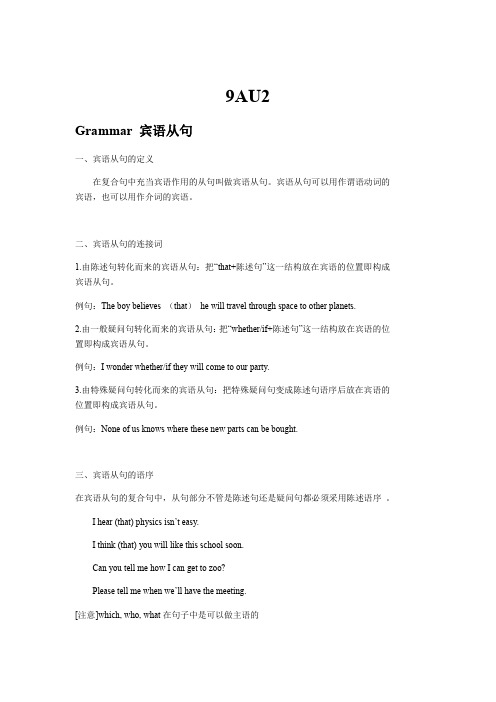
9AU2Grammar 宾语从句一、宾语从句的定义在复合句中充当宾语作用的从句叫做宾语从句。
宾语从句可以用作谓语动词的宾语,也可以用作介词的宾语。
二、宾语从句的连接词1.由陈述句转化而来的宾语从句:把“that+陈述句”这一结构放在宾语的位置即构成宾语从句。
例句:The boy believes (that)he will travel through space to other planets.2.由一般疑问句转化而来的宾语从句:把“whether/if+陈述句”这一结构放在宾语的位置即构成宾语从句。
例句:I wonder whether/if they will come to our party.3.由特殊疑问句转化而来的宾语从句:把特殊疑问句变成陈述句语序后放在宾语的位置即构成宾语从句。
例句:None of us knows where these new parts can be bought.三、宾语从句的语序在宾语从句的复合句中,从句部分不管是陈述句还是疑问句都必须采用陈述语序。
I hear (that) physics isn’t easy.I think (that) you will like this school soon.Can you tell me how I can get to zoo?Please tell me when we’ll have the meeting.[注意]which, who, what在句子中是可以做主语的I wonder who is Tom’s English teacher.I don’t know what can be avoided.四、宾语从句的时态1. 如果主句的时态是一般现在时,宾语从句该用什么时态就用什么时态。
I don’t think (that) you are right.Please tell us where he is.Can you tell me how I can get to the railway station?2. 如果主句的时态是一般过去时,宾语从句只能用相应的过去时态(一般过去时,过去进行时,过去将来时,过去完成时)。
牛津译林版 英语 7B Unit2 语法一般将来时学案设计+练习(含答案)
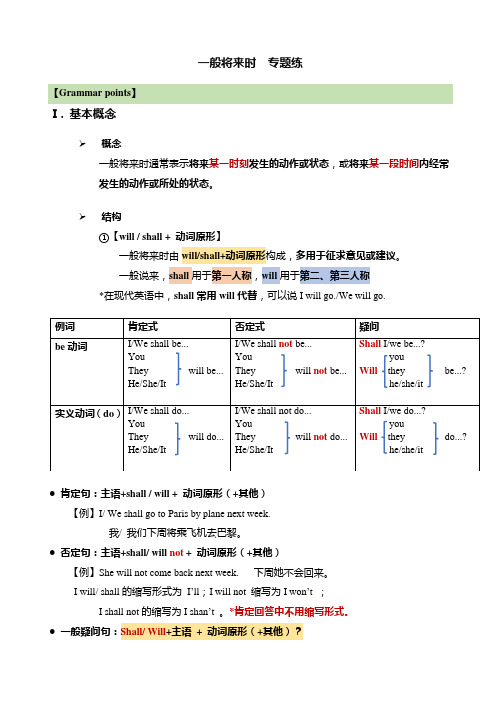
一般将来时专题练【Grammar points】Ⅰ. 基本概念➢概念一般将来时通常表示将来某一时刻发生的动作或状态,或将来某一段时间内经常发生的动作或所处的状态。
➢结构①【will / shall + 动词原形】一般将来时由will/shall+动词原形构成,多用于征求意见或建议。
一般说来,shall用于第一人称,will用于第二、第三人称*在现代英语中,shall常用will代替,可以说I will go./We will go.●肯定句:主语+shall / will + 动词原形(+其他)【例】I/ We shall go to Paris by plane next week.我/ 我们下周将乘飞机去巴黎。
●否定句:主语+shall/ will not + 动词原形(+其他)【例】She will not come back next week. 下周她不会回来。
I will/ shall的缩写形式为I’ll;I will not 缩写为I won’t ;I shall not的缩写为I shan’t 。
*肯定回答中不用缩写形式。
●一般疑问句:Shall/ Will+主语+ 动词原形(+其他)?【例】Will you be at home tonight? 今晚你会在家吗?●特殊疑问句:特殊疑问词+shall/ will+主语+ 动词原形(+其他)?【例】What will you do next weekend? 下周末你将做什么?②【be going to + 动词原形】表示计划、打算做某事,表示已决定的并很可能发生的事。
*be going to相当于一个助动词,与后面的动词原形一起构成谓语be动词的形式随主语的人称和数可变为am,is或are。
●肯定句:主语+be going to + 动词原形...【例】Jack is going to buy a car. 杰克打算买一辆汽车。
新版牛津译林英语七年级下册7BUnit2Grammar

将来时的典型标志:
Tomorrow (morning/afternoon …) next Tuesday / week / month …
this afternoon … /Sunday …
the coming Sunday … 即将到来的星期天…
tonight 今夜
soon 不久
in + 一段时间 ……后
2. 否定句: will/shall + not + v.原形 缩写 won’t/shan’t + v.原形 The boy will not /won’t play football tomorrow.
I shall not /shan’t cook supper next Monday. 3. 一般疑问句: 将will/shall置于句首。
5. 特殊疑问句: 我们将玩什么?
What will/shall we play? 我们将和谁玩? Who will we play with? 我们明天将在哪里玩? Where will/shall we play tomorrow? 我们将什么时候玩? When will/shall we play?
2. Lily’s bicycle is broken. She’s going to ask someone to fix it.
3. Little Tom has problems with his homework. Some college students will help him.
4. Grandma Chen is sick these days. Some people will visit her and do some shopping for her.
译林版七年级英语Unit 2Grammar课件

Millie and her classmates
dance go like play watch
1. I _l_ik__e_ playing volleyball. 2. Kitty _d_a_n_c_e_s very much. 3. Amy __g_o_e_s_ swimming every week. 4. Simon often _p__la_y_s_ football with his
friends. 5. Daniel sometimes w__a_t_ch__es_ball games on
TV.
Use the information to complete the questions.
1. _D__o_ Sandy and Kitty enjoy listening to music? _Y_e_s_, _th__ey__d_o_.
He now lives in Beijing.
The forms of the simple present tense The simple present tense has these forms. Read them and note that we add –s to the verb after he/she/it in positive sentences.
with his classmates after school. 4. All these children c_o_m__e(come) from
Sichuan Province.
B) 请根据汉语句子意思,完成英语句 子,每空词数不限。 5. 我不喜欢摇滚音乐。 I _d_o_n_’_t_l_ik_e_ rock music. 6. 那些男孩子个子不高。 Those boys _a_r_e_n_’_t_/_a_r_e_n_o_t__ tall.
江苏新版牛津英语7B-Unit-2-知识点

7B Unit 2 知识点Comic strip1.I’m going to visit our new neighbours. 我将要去拜访我的新邻居们。
1) visit v. 参观,拜访visitor n. 访问者,参观者eg: They are visiting Shanghai. 他们正在参观上海。
visit sb. 拜访某人visit sp. 参观某地eg: I’m going to visit my aunt. 我打算去看望我的姑妈。
Many tourists visit China every year. 每年都有许多游客到中国参观。
visit n. 访问,参观eg: They go on a visit to the seaside. 他们去海边游玩。
2) neighbour(s) 邻居n. 美式: neighbor(s)eg: Everyone wants a nice neighbour. 每个人都想要一个好邻居。
2.I’m afraid they won’t welcome visitors like you. 我恐怕他们不会欢迎像你们这样的游客。
1) I’m afraid… 用于礼貌或正式道歉或表示遗憾、对不起、恐怕等,一般用作插入语。
eg: I’m afraid I must leave. 恐怕我得走了。
I’m afraid not 恐怕不行,表示认为对方的意见可能不会发生,是委婉的否定。
eg: ---Would you like to go shopping with me? ---I’m afraid not. I have to do my homework.---和我去购物怎么样?---恐怕不行。
我得做家庭作业。
2) like prep. 像,相似,类似,不能单独使用,要与动词连用be like 像look like 看起来像seem like 仿佛,似乎eg: The Sun is like a great ball of fire. 太阳像个巨大的火球。
七年级英语译林版上册Unit2-Grammar名师教案
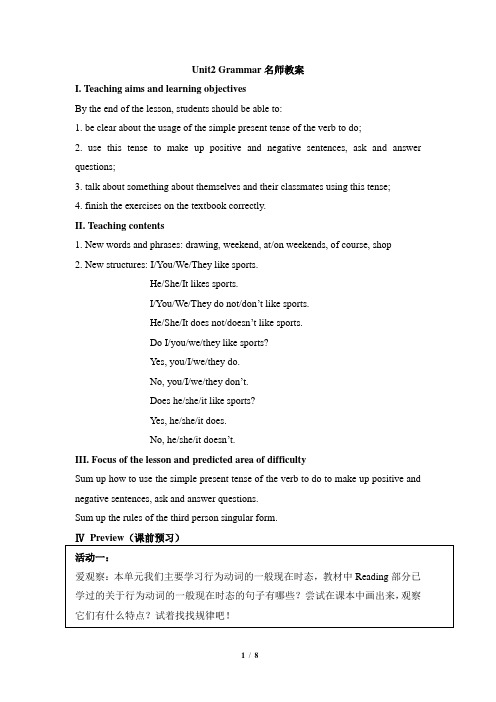
Unit2 Grammar名师教案I. Teaching aims and learning objectivesBy the end of the lesson, students should be able to:1. be clear about the usage of the simple present tense of the verb to do;2. use this tense to make up positive and negative sentences, ask and answer questions;3. talk about something about themselves and their classmates using this tense;4. finish the exercises on the textbook correctly.II. Teaching contents1. New words and phrases: drawing, weekend, at/on weekends, of course, shop2. New structures: I/You/We/They like sports.He/She/It likes sports.I/You/We/They do not/don’t like sports.He/She/It does not/doesn’t like sports.Do I/you/we/they like sports?Yes, you/I/we/they do.No, you/I/we/they don’t.Does he/she/it like sports?Yes, he/she/it does.No, he/she/it doesn’t.III. Focus of the lesson and predicted area of difficultySum up how to use the simple present tense of the verb to do to make up positive and negative sentences, ask and answer questions.Sum up the rules of the third person singular form.ⅣPreview(课前预习)活动一:爱观察:本单元我们主要学习行为动词的一般现在时态,教材中Reading部分已学过的关于行为动词的一般现在时态的句子有哪些?尝试在课本中画出来,观察它们有什么特点?试着找找规律吧!活动二:爱思考:仔细阅读教材Grammar部分,注意动词第三人称单数的变化规则,观看视频讲解,尝试总结,我学到了什么?试着画出思维导图,拍照上传,与大家分享吧!活动三:爱创作:用学到的语法结构,再结合着本单元已学到的知识,尝试用一般现在时态编一段对话或者故事,并将自己的成果上传分享!【备注:学生登录“优教·同步学习网”完成本课时预习任务,教师可通过备课端查看预习结果反馈,针对性进行课堂教学】Ⅴ. Teaching proceduresStep 1 Lead-inT: Today we’ll learn grammar of Unit 2—the simple present tense of the verb to do. Boys and girls, let’s play a guessing game first. There is a photo in my hand. Can you guess who is it? You can guess like this: Is it a man? Is he/she a teacher? Is he/she famous? You are so clever. This is Messi. Can you tell me anything about him? Pay attention to these sentences.He looks strong. He plays football very well.He wants to play in the next World Cup.Many students like him.T: All the sentences are written in the simple present tense of the verb “to do”.【设计意图】通过学生比较感兴趣的游戏导入新课,使其迅速进入本课话题,增加了课堂的趣味性,运动员梅西的资料介绍即复习了上节课的一些内容,同时又导出了今天所学的语法项目,一举两得。
初一英语导学案(7B_Unit2_Grammar_)
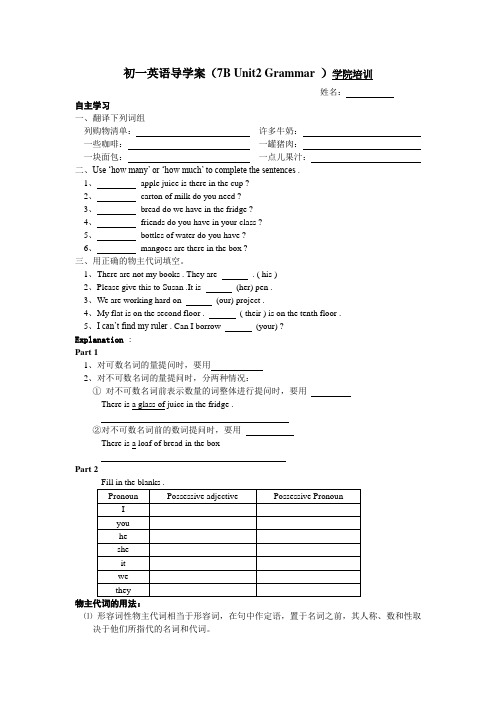
初一英语导学案(7B Unit2 Grammar )学院培训姓名:自主学习一、翻译下列词组列购物清单:许多牛奶:一些咖啡:一罐猪肉:一块面包:一点儿果汁:二、Use ‘how many’ or ‘how much’ to complete the sentences .1、apple juice is there in the cup ?2、carton of milk do you need ?3、bread do we have in the fridge ?4、friends do you have in your class ?5、bottles of water do you have ?6、mangoes are there in the box ?三、用正确的物主代词填空。
1、There are not my books . They are . ( his )2、Please give this to Susan .It is (her) pen .3、We are working hard on (our) project .4、My flat is on the second floor . ( their ) is on the tenth floor .5、I can’t find my ruler . Can I borrow (your) ?Explanation :Part 11、对可数名词的量提问时,要用2、对不可数名词的量提问时,分两种情况:①对不可数名词前表示数量的词整体进行提问时,要用There is a glass of juice in the fridge .②对不可数名词前的数词提问时,要用There is a loaf of bread in the boxPart 2物主代词的用法:⑴形容词性物主代词相当于形容词,在句中作定语,置于名词之前,其人称、数和性取决于他们所指代的名词和代词。
牛津译林版七年级下册Unit2Grammar课件
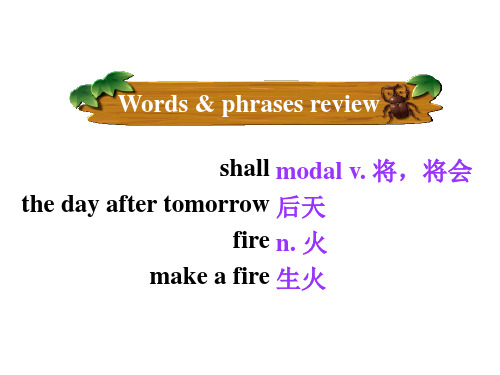
5. Tomorrow is mum’s birthday. _S_h_a_l_l we _h_a_v_e_ (have) a party for her, Dad?
6. Jim, what _s_h_a_ll_ I _b_u_y_ (buy) for the coming party?
7. — _I_s_ Tom _g_o_in_g__t_o_w__a_tc_h_ (watch) the basketball match the day after tomorrow?
一般将来时构成方式二: be going to+____________ 表示近期将要发生的动作或存在的状态, 以及计划、安排、打算要做的事。
We’re going to meet at the school gate. 我们打算在学校门口见面。
Look! It’s going to rain. 瞧!天快下雨了。
—Really? But it ____ a problem if he
works hard.
A. will be
B. doesn’t
C. won’t be
D. is
II. 用括号内所给动词的适当形式填空。
1. I _w_i_l_l _b_e (be) 14 years old next year. 2. Mr Li ___w__il_l_v_i_si_t_ (visit) Taiwan
5. Wow! New neighbours! I_’_ll_ _m_e_e_t_ them too!
1. Simon _____ here next month. A. isn’t working B. doesn’t working C. isn’t going to working D. won’t work
七年级英语下册第二单元知识点详细总结(译林版)

7B Unit2 知识点总结Comic strip1.I'm afraid they won't welcome visitors like you. 恐怕他们不会欢迎像你这样的客人。
(1)I'm afraid 译为“恐怕”,是一种口语表达习惯,通常不用he's afraid, she's afraid.例:I'm afraid it is going to rain tomorrow. 恐怕明天要下雨了。
补充:①be afraid of sth 害怕某物我害怕蛇②I'm afraid so. 我恐怕是这样的。
I‘m afraid not. 我恐怕不是这样的。
I think so. 我如此认为。
I don't think so. 我不这样认为。
③be afraid of doing sth④be afraid to do sth 表示“怕….. ”之意---Can I have dinner with you?我能与你共进晚餐吗?--- Sorry, I'm afraid not.这里的意思是:对不起,不能(2)visitor 派生词由visit演变职业cashier cleaner dancer driver engineer farmer manager officer painter playerreporter singer shopkeeper teacher waiterwaitress worker writer actress actordoctor dentist astronaut(宇航员)artist hostpilot policeman postman model cooknurse2.like介词:像look like/ be like动词:喜欢like doing sth3.Most of them have 14 floors.大多数楼有14层。
- 1、下载文档前请自行甄别文档内容的完整性,平台不提供额外的编辑、内容补充、找答案等附加服务。
- 2、"仅部分预览"的文档,不可在线预览部分如存在完整性等问题,可反馈申请退款(可完整预览的文档不适用该条件!)。
- 3、如文档侵犯您的权益,请联系客服反馈,我们会尽快为您处理(人工客服工作时间:9:00-18:30)。
用will和shall填空
1. Everyone _____ will come next week. 2. You and I ______ will study English tomorrow. 3. We ___________ shall/will go to enjoy the fashion show tomorrow evening. will go home next Sunday. 4. Most of us ______ Shall I watch TV the day after tomorrow? 5. ______
They are going to play football.
They are going to fly kites.
一般将来时
(Simple Future Tense )
一、一般将来时的意义:
用来描述一个即将要发生的动作;谈 论未来的计划和打算。
一般将来时用法(一) be going to+动词原形
Shall:将
用法和will一样,shall+动词原形do
小试牛刀: 我们将明天见面(肯定句,否定句,一般疑问句)
We shall meet tomorrow. We shall not meet tomorrow. shan’t Shall we meet tomorrow?
肯定句:shall +动词原形
1.We are going to have a sports meeting next month. We aren’t going to have a sports meeting next month. Are you going to have a sports meeting next month? What are you going to do next month? 2.Daniel is going to study computer this afternoon.
Amy: How about your uncle? is going to make Simon: He ________________ (make) a fire. is Amy: And your aunt? What ____ going to do she _____________ (do)?
is going to cook Simon: She _______________ (cook) some food.
What is A. Jack B. Jack C. Jack How old A. Jack B. Jack C. Jack
Jack going to do? is going to watch a film. is going to buy some things. is going to chat with Neil. will Jack be? will be five hundred years old. will be three hundred years old. will be six hundred years old.
Simon: Hi, Amy. My parents and I are planning a day out with my uncle’s family the day after tomorrow.
are Amy: Great! What ________ you going to do ________________ (do)?
will 引导的一般将来时:表示将来发生的动作或现在制定的计划, 最基本的结构:主语+will+动词原形+宾语 will do(动词原形) 1.肯定:______+_______ will not/won’t do 2.否定: ____________+______ 3.一般疑问句:把________ will 提前 will not/won’t 肯定回答用______/ .will not 可缩写成 will 否定回答用_______ won’t ____
一般将来时
I am going to visit the park at the weekend. What am I going to do in the park?
I am going to watch birds in the park.
watch birds
have a picnic go boating
练习
• He will go to Paris next month. • 否: He will not go to Paris next month.
won’t • 一般: Will he go to Paris next month. Yes, he will. No, he won’t. • 特殊: Where will he go to Paris next month.
特殊疑问句 特殊疑问词 + be ( am, is, are ) + 主语 + going to + 动词原形
把下列句子改为否定句和疑问句. 1. We are going to have a sports meeting next month. We aren’t going to have a sports meeting next month. Are you going to have a sports meeting next month? What are you going to do next month?
Simon is going to have a day out with his uncle’s family the day after tomorrow. What are they going to do for the day out?
Finish the exercise on P24.
be going to各种句式:
肯定句 :主语 + be ( am, is, are ) + going to + 动词原形 否定句 :主语 + be ( am, is, are ) + not + going to + 动词原形
疑问句 Be ( am, is, are ) + 主语 + going to + 动词原形
We use be going to when we talk about: 1. 决定、打算将来要做的事 2. 根据某种迹象推断很可能要发生的事
1.我打算去拜访我的新邻居。 I’m going to visit our new neighbours.(计划) It’s so cloudy. I think it’s going to rain. (根据事实推断极有可能发生) 基本结构:主语+ be(is are) going to +动原
Jack is going to buy some things. Jack will be five hundred years old. Jack will run fifty miles. Neil will buy a car for Jack.
一般将来时态(二)
will / shall + 动词原形
I am going to have a picnic in the park.
I am going boating in the park.
She is going to play the piano.
They are going to have a birthday party.
He is going skating.
How many miles will Jack run each day? A. Jack will run twenty miles. B. Jack will run forty miles. C. Jack will run fifty miles. What will Neil buy for Jack? A. Neil will buy a car for Jack. B. Neil will buy a bike for Jack. C. Neil will buy a book for Jack.
Daniel isn’t going to study computer this afternoon. Is Daniel going to study computer this afternoon? What is Daniel going to do this afternoon? 3.They are going to see the film this evening. They aren’t going to see the film this evening. Are they going to see the film this evening?
阅读六个句子,讨论并完成问题2-7 1. She will help the children with their lessons. 2. They will help the old make dumplings. 3. I /we will not tell it to him. 4. Jim won’t go to see a film this afternoon 5.Will he help you? Yes, he will./No, he will not /won’t. 6.Will there be heavy rain tomorrow?
I. 句型转换: 1. Amy will do her homework tonight. (否定句) Amy won’t do her homework tonight. (一般疑问句) Will Amy do her homework tonight? (肯定、否定回答) Yes, she will. No, she won’t. (对划线部分提问) What will Amy do tonight?
